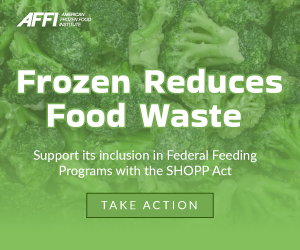Arlington, VA – A story published in the Washington Post on July 31 provided tips for reducing risk of contracting a foodborne illness from frozen foods. We want to set the record straight when it comes to the safety of frozen foods.
For starters, consumers should feel confident in turning to frozen foods as convenient, safe and delicious options to feed their families. Frozen vegetables should be cooked according to package instructions. Frozen fruit, however, is ready to eat.
From the American Frozen Food Institute’s (AFFI) President and CEO Alison Bodor:
“The fact of the matter is frozen foods are low risk as it relates to the potential for causing foodborne illnesses. The risk of foodborne illness today is no greater than it has been in the past. Naturally, more testing may lead to more findings, but it’s important to keep the findings in context.
“Frozen berries have a long history of safe use in the United States. AFFI supports the intent of the U.S. Food and Drug Administration’s (FDA) sampling assignment to increase the understanding of the risk of Hepatitis A and Norovirus in frozen berries. We welcome data-based approaches that could lead to the development of future food safety preventive controls that further enhance our food safety practices and ensure that Americans have convenient access to safe and nutritious frozen foods.”
Bodor adds that AFFI is in agreement with the Post’s recommendation that frozen vegetables should be fully cooked.
“In addition, there is room for more consumer education about food safety. We want to ensure consumers understand that most frozen foods are intended to be cooked and the safest way to consume any product is to carefully follow the package cooking or preparation instructions. Frozen vegetables, like peas for example, should be prepared according to the cooking instructions provided by the manufacturer on packaging to ensure safe consumption. Frozen fruits on the other hand, like frozen strawberries, don’t require cooking at all. Frozen fruits are intended to be thawed and consumed right out of the bag. The bottom line is frozen foods vary and are specifically labeled in accordance with food safety standards and regulations.”
Bodor concludes:
“As the member-driven national trade association that represents the interests of all segments of the frozen food industry, AFFI is committed to advancing food safety practices throughout the frozen value chain. On the journey from farm to freezer to table, it takes many people to keep foods safe.
“We’re doing our part to keep foods safe by exercising the highest standards of food manufacturing and food safety across the globe. The frozen food industry is committed to the continuous enhancements of its food safety practices. AFFI’s Food Safety Zone, AFFIFoodSafety.org, is the latest example of how the industry is raising the bar on food safety practices.”
AFFI invites consumers to learn more by visiting the Partnership for Food Safety Education (PFSE) for free resources on how to reduce the risk of foodborne illness at home: https://www.fightbac.org/wp-content/uploads/2018/08/2018-StoryDinner-FoodSafetyTips-Handout.pdf.
The American Frozen Food Institute (AFFI) is the member-driven national trade association that advances the interests of all segments of the frozen food and beverage industry. AFFI works to advance food safety and advocates before legislative and regulatory entities on the industry’s behalf to create an environment where members’ foods and beverages are proudly chosen to meet the needs of a changing world.




